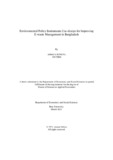| dc.description.abstract | ‘Electronic Waste’ or ‘E-waste’ management is a growing concern in Bangladesh, as the toxic
components of E-waste have a severe effect on health and the environment. The existing
policies for managing such environmental problems are largely based on regulatory measures
ignoring the economic and ethical dimensions. With this view, the central objective of this
study is to propose a policy package combining regulatory, economic, and persuasive
measures. Together they are denoted as Environmental Policy Instruments (EPI).
For doing so, the research has been conducted in two phases. In the first phase, the study
investigates the current E-waste situation in Bangladesh concerning (i) E-waste generation,
collection, and disposal practices; (ii) the condition of workers engaged in E-waste recycling;
(iii) consumer and public awareness on E-waste management; and (iv) the existing legal
framework for its management. In the second phase, an EPI use-design is proposed to improve
the E-waste management practices. In doing so, E-waste generators' feedback has been
considered. The main database of the study, compiled through an online survey, includes
information on E-device usage, its disposal, and consumer awareness. Secondary sources were
the basis of compiling information on E-waste generation, recycling, condition of workers
involved in E-waste recycling, and their corresponding legal framework in the country.
Findings of the study include that only 11.1% of the consumers dispose of their discarded Edevice as waste, of which only 23% of E-waste is appropriately processed for recycling, and
the rest is disposed of by either burning or dumping on the ground. Despite E-waste
management being a highly hazardous occupation, the wage of the laborers in the E-waste
recycling industry in Bangladesh is extremely low (3,000 taka a month). The awareness and
concern among the consumers on E-waste generation, its effect on nature and life, and the
importance of its sustainable management are limited regardless of respondents’ education or
profession. Concerning the legal framework, the study finds that the existing policies regarding
E-waste management are largely based on environmental Acts and other regulatory
frameworks. Although a guideline for E-waste management has been drafted, no exclusive
guideline or policy for E-waste management is currently in practice in Bangladesh.
Finally, a target-specific EPI use-design is presented comprising (i) regulatory instruments
(regulation, supervision, identification) to control the generation, recycling of E-waste, and
ensure labor rights and safety, (ii) economic instruments (pollution tax, recognition,
investment) to discourage the cheap and hazardous methods of recycling, disposal, and
encourage research and development to transform E-waste recycling industry into a profitable
business opportunity, and (iii) persuasive instruments (social engagement, awareness
campaign, curriculum reform) to raise awareness of E-waste stakeholders on the importance
and ways and means of its sustainable management. | en_US |

